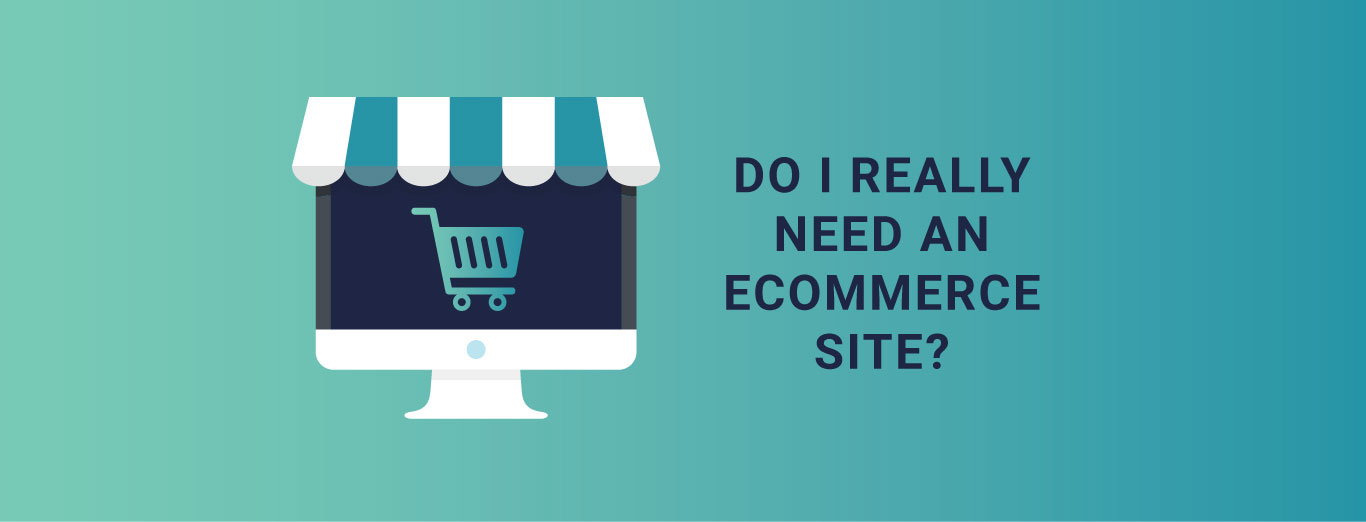Why Your Small Business Needs E-Commerce

Over time, more and more of us do our shopping online.
Everything from groceries to bespoke goods can be purchased in just a few clicks! Proponents of online shopping all say that the time savings and greater scope of options online are why they prefer to shop digitally. Online shopping is a huge benefit to small businesses too! It’s one huge way to bridge the gap between small business and big box stores. Having a fully-functional website is a great starting point for your business, but for some small businesses, adding the option of small business E-commerce can add a huge new revenue stream too!
What is E-commerce?
The simple answer? Electronic commerce (known as E-commerce) is used by consumers and businesses to exchange goods and services online. Whether you sell B2B or B2C, you have the ability to facilitate a sale through the internet. Some examples of e-commerce include retail, wholesale, digital products, physical products, and subscription-based products.
Why E-commerce is Great for Small Business
E-commerce can help prevent your small business from falling behind your competitors, while also providing a new source of revenue as more consumers choose to shop online! For example, we helped The Velvet Cactus introduce eCommerce to their website. They’re now able to sell their catering services along with gift cards straight from their website, adding a new revenue stream to their business.
Lower operating costs
If you’re running a brick and mortar storefront, your costs tend to include utilities, rent, staff, and more! It can all add up pretty quickly. Opening a small business e-commerce store, however, is a low investment and costs less to operate! Adding E-commerce may mean getting a new website, but once you’re up and running your ongoing operation costs won’t require much more than what is already currently available at your brick and mortar location. And, for businesses that are just starting out, selling online is much less expensive than getting a brick and mortar set up!
Customer Tracking
With e-commerce, you have the ability to gather data and analytics about your customers including tracking where the traffic is coming from, how long they stay on your site, and where they are clicking on your site. You can utilize this information to re-target customers who visit but don’t buy or abandon their cart. This type of remarketing is super effective because the ads people see are in context to the products they were just looking at and remember.
Build Relationships with Customers
Gather information about your online shoppers to better communicate with them. When they check-out at your online store, you can collect valuable information such as their name, email address, mailing address, birthday, and phone number. With those five pieces of information, you now have multiple ways to communicate with consumers and build a relationship with them.
Inventory Management
Integrate sales and inventory management between your online store and your brick and mortar storefront. With the online data you’ve obtained from tracking your customers, you get a better idea of how to manage your inventory.
Widen Your Reach and Increase Sales
With small business e-commerce, you are no longer limited to just local foot traffic. You can expand your geographic reach and gain brand exposure. Both of these can help you land new customers you wouldn’t normally have access to, from all over the world! Also, with an online store, you are no longer limited to your normal store hours. Yes, we’re talking about being open 24/7 for those who can’t make it to your storefront or who work odd hours.
What to Look for in E-Commerce Platforms
- Price: Monthly service fees and transaction fees tend to be the main expenses associated with e-commerce platforms. Most charge a fee to accept credit card transactions, which is typically a small percentage of every online purchase.
- Mobile Friendly: According to the Pew Research Center, 8 in 10 Americans shop online and 51% of them have purchased something with their smartphones. That number is only expected to rise more through 2019. You need to work with a platform that has a mobile-optimized site.
- User Experience and Customer Service: You want an e-commerce platform that can provide 24/7 customer service via multiple channels (i.e., by phone, via text, or on a live chat). Also, you want to make things easy for your customers. Navigating through your online store and making a purchase should be an easy process for anyone and everyone.
- Security: According to Small Business Trends, 43% of cyber attacks target small business, so cybersecurity should be a top priority! When choosing a platform, make sure your website has an SSL Certificate. SSL Certificates are required for ALL e-commerce sites and protect your information and the information your consumers provide.
- Integration: E-commerce integration simply means being able to transfer your data between systems. This would end the need to enter the same information over and over on systems individually. For example, keeping track of how much inventory you have.
Our Top E-commerce Suggestion
We love using WooCommerce to create shoppable websites for our clients. It’s our top recommendation for small business e-commerce websites! WooCommerce is one of the most, if not the most, popular eCommerce platform for building a digital storefront.
WooCommerce is a free open-source e-commerce plugin on WordPress. It’s incredibly versatile and you keep 100% control over all of your data. First time creating an online store? WooCommerce is perfect for you because it’s easy for beginners to use! Anyone can set up and run a professional online store directly from their WordPress site.
Ready to rock your e-commerce website? Let’s chat all about it in a free strategy session!
